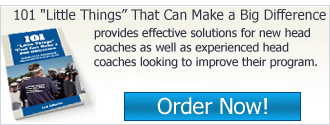I had an epiphany last week on the practice field at the local high school that I’ve been helping with this season. My role was supposed to have been as a “consultant” to the head coach. What this basically means is that I make recommendations and he makes decisions. It has been a very good relationship. However, because of this close relationship, the (paid) assistant coaches were being ignored. This became clear to me last week.
We were in the middle of offensive 7 on 7 while the O line was at the other end working on pass protection. The HC is also the O line coach so he was 50 yards away. I was the one running the 7 on 7 drills. (Remember… I’m only a consultant.) At one point during the drill, I sensed God’s Holy Spirit nudging me to “take a look around.” What I saw was very disturbing. The assistant coaches were basically gathered on the sideline talking among themselves. It was a real wake up call for me.
Later that evening I called the HC and told him what I had observed and… to let him know that I would not be attending practices anymore. At least for a couple of weeks. My desire to “get to work” and keep practice moving had caused me to over-step my level of responsibility. As my wife told me later that evening when I explained the situation, “It sounds to me like you’re a Coach— NOT a Consultant!” She was right. So, I explained to the HC that he was going to have to shake up his staff and get them out on the field and coaching. They do a great job during Individual period. They’re good, young coaches. By removing myself from the practice field, they are going to have to step up and step in and contribute a lot more during Group and Team periods. What I had taught them was what psychologists call learned laziness! They could step back and do nothing because “Ole Coach J” was going to run the show for them.
The HC has had to speak up several times during subsequent practices to get the assistants to get out of their comfort zone and continue to coach/teach/encourage/correct throughout the entire practice. Why does he have to do this more than once? Because a habit had been formed. One does not break a habit with one try. He will probably have to speak up numerous times throughout the next few weeks until it “clicks” in the minds of the assistants that… “Coach J is not around to step in and do my job. I need to get busy.”
It is imperative that a HC understand that he has to “coach the coaches” before he ever thinks about coaching the players. I learned this from one of my coaching mentors. Get your staff organized and make sure that they are clear about the expectations that you, as HC, have for them. If they are not meeting those expectations, you will need to remind them during practice. If a coach continues to fall below the level of your expectations, then a private meeting is in order. If that does not change things, it may be time to plan on letting that coach go and find someone else who wants to work!
This should occur during the off-season. Monthly staff meetings need to include a period where your expectations are stated, then discussed. But, unless the HC is disciplined enough to stay on his staff once practice begins… there are going to be people who will always look to take the easy way out. The HC is responsible for his assistants. He is the one who has to lead the team. And that “team” includes the coaching staff.

